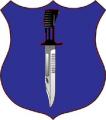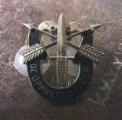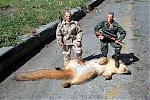Counterinsurgency is what you call an operation conducted by a large military presence that lacks so much intelligence collection capability that an enemy force can be constituted and coalesce around the military, without the military even realizing it, and the military then commences to fight against that enemy without any significant ability to discern civilian from combatant.
Hypothetical: Suppose we are fighting against an insurgency in a country where the population is suspicious of us and does not want us around. Suppose we know who every one of the "irreconcilables" are, where they are, and we have sufficient forces in place to promptly kill or capture them with minimal civilian casualties or collateral damage to local infrastructure/property. We also know who the fence-sitters are and how to avoid them. How tough would that counterinsurgency campaign be?
In terms of our professional training as Soldiers and leaders, there is nothing significant that needs to change. Recent operations simply have highlighted the areas in which we have been most negligent in failing to prepare as a nation. Most significantly, as a national security community - the whole 3-letter alphabet soup of military, intelligence, and other agencies - we have done a horrible job of maintaining our capability to collect, process, analyze, and disseminate intelligence in a manner that can drive our operations. The end result resembles a boxer going into the ring blindfolded. Instead of his trainers tearing off the blindfold, they start debating whether he needs to take up kickboxing or whether his determination to win this fight in spite of the blindfold will instill bad habits in him that might impact future bouts where he fights without a blindfold.
People scoff at the notion that, "we win every firefight."
"That doesn't matter," they say. "Just remember, we won every battle in Vietnam."
Exactly. Whether we are fighting insurgents in Iraq, Taliban in Afghanistan, foreign fighters in either country, a mix of regular and irregulars in Vietnam, old-school Soviet-style formations in Iraq, Panamanian whatevers, drugged stick figures in Somalia, etc, etc, we stomp the bejeezus out of the poor saps who choose to fight. What we lack is the ability to figure out who the bad guy is, how to locate him, and how to discern bad guy from civilian. Does that really call for a major change in how we train our combat arms Soldiers? Or is that a dramatic failure of intelligence? I say the latter. But because of the "can do" "make it happen" attitude in the military, the military is too quick to take full responsibility and adjust for the shortcomings of the rest of the government. That may be well and good in the short term, but the military also suffers from a propensity to overprepare and overdo everything, which is exactly what all of the COIN vs conventional nonsense is about.
The "COIN skills" that people talk about - language training, cultural awareness, etc - are nothing more than means to mitigate for the woeful shortcoming in our intelligence systems. That is the equivalent to training the boxer to occasionally push up on his blindfold with his oversized boxing gloves, rather than just removing the damn thing before he goes into the ring. Our training objectives do not need to change based upon whether we expect to fight COIN or conventional. The direct combat capabilties needed for each are the same.
What we need is to figure out how to develop the necessary situational awareness for our military. Otherwise, we're sending a blindfolded Gold Glove boxer into the ring against Glass Joe and we're going to lose. The only excuse for fundamentally changing how we train and shifting focus toward "COIN skills," or whatever term one wants to use, is if we assume that we will not be able to develop the intelligence systems in the next several years necessary to support our military in operations similar to those that we are having so much difficulty with today.
Flawed doctrine? Flawed strategy? No and no. Inadequate intelligence systems.














Bookmarks